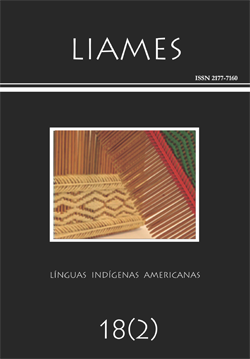Resumo
In the last three decades, adjectives have played an important role in the typology of parts-of-speech systems in terms of which meanings are cross-linguistically expressed by members of this class, and whether all languages in the world have an adjective class at all. In this paper, the focus is on the property-concept words in Deni, an Arawá language spoken by about 1,600 people who live in ten villages in Southern Amazonia, Amazonas State, Brazil. The analysis of property-concept lexical items in Deni has led me to assign them to a part-of-speech class which is distinct from those of verbs and nouns. The assignment has followed the Deni-specific criteria for recognizing the verb, noun, and adjective classes.Referências
Aikhenvald, Alexandra Y. (2008). Versatile cases. Journal of Linguistics 44: 565-603. doi:10.1017/S002222670800532X
Aikhenvald, Alexandra Y. (2009). Syntactic ergativity in Paumari. In Samuel Gyasi Obeng (ed.). Topics in descriptive and African linguistics: Essays in honour of distinguished Professor Paul Newman, pp. 111-127. Munich: LINCOM Studies in African Linguistics.
Aikhenvald, Alexandra Y. (2012). The languages of the Amazon. Oxford: Oxford University Press.
Bauer, Laurie (2008). Derivational morphology. Language and Linguistics Compass 2(1): 196-210. https://doi.org/10.1111/j.1749-818X.2007.00045.x
Beck, David (2002). The typology of parts of speech systems: The markedness of adjectives. New York: Routledge.
Carvalho, Mateus Cruz Maciel de (2013a). Considerações sobre a fonologia da língua Deni (Arawá). In Leopoldo O. Lasbastía Mendoza (ed.). Cuestiones de fonética, fonología y oralidad, pp. 89-104.. Leopoldo O. Lasbastía. Mendoza: Facultad de Filosofía y Letras, Universidad Nacional de Cuyo.
Carvalho, Mateus Cruz Maciel de (2013b). A fonologia da língua Deni (Arawá). São Paulo: Cultura Acadêmica.
Carvalho, Mateus Cruz Maciel de (2017). Estudo morfossintático da língua Deni (Arawá) (Tese de doutorado em linguística e língua portuguesa). São Paulo: Universidade Estadual Paulista “Júlio de Mesquita Filho”. https://repositorio.unesp.br/handle/11449/150841
Chapman, Shirley; Derbyshire, Desmond C. (1991). Paumarí. In Desmond C. Derbyshire; Geoffrey K. Pullum (eds.). Handbook of Amazonian languages, vol. 3, pp. 161-352. Berlin: Mouton de Gruyter.
Croft, William (1991). Syntactic categories and grammatical relations: The cognitive organization of information. Chicago: Chicago University Press.
Croft, William (2000). Parts of speech as typological universals and as language particular categories In Petra Maria Vogel; Bernard Comrie (eds.). Approaches of the typology of word classes, pp. 65-102. Berlin: Mouton de Gruyter
Croft, William (2003). Typology and universals 2nd edn. Cambridge: Cambridge University Press.
Dienst, Stefan (2008). The internal classification of the Arawan languages. LIAMES – Línguas Indígenas Americanas 8: 61-67. doi: https://doi.org/10.20396/liames.v8i1.1471
Dienst, Stefan (2014). A grammar of Kulina. Berlin: Mouton de Gruyter.
Dixon, R. M. W. (1982). Where have all the adjectives gone? And other essays in semantics and syntax. Berlin: Mouton de Gruyter.
Dixon, R. M. W (1994). Ergativity. Cambridge: Cambridge University Press.
Dixon, R. M. W. (1995). Fusional development of gender marking in Jarawara possessed nouns. International Journal of American Linguistics 61(3): 263-94. doi:10.1086/466256
Dixon, R. M. W. (1999). Arawá. In R. M. W. Dixon; Alexandra Y. Aikhenvald (eds.). The Amazonian languages, pp. 294-306. New York: Cambridge University Press.
Dixon, R. M. W. (2004a). Adjective classes in typological perspective. In R. M. W. Dixon; Alexandra Y. Aikhenvald (eds.). Adjective classes: A cross-linguistic typology, pp. 1-49. Oxford: Oxford University Press.
Dixon, R. M. W. (2004b). The Jarawara language of Southern Amazonia. Oxford: Oxford University Press.
Dixon, R. M. W. (2004c). The small adjective class in Jarawara. In R. M. W. Dixon; Alexandra Y. Aikhenvald (eds.). Adjective classes: A cross-linguistic typology, pp. 177-198. Oxford: Oxford University Press.
Dixon, R. M. W. (2006). Annotated bibliography of the Arawá language family to 1950. International Journal of American Linguistics 72(4): 522-34. doi: 0.1086/513059
Dixon, R. M. W. (2010). Basic linguistic theory, vol 2. Grammatical topics. Oxford: Oxford University Press.
Everett, Daniel (1995). Sistemas prosódicos da família Arawá. In Leo Wetzels (ed.). Estudos fonológicos das línguas indígenas brasileiras, pp. 297-340. Rio de Janeiro: Editora da UFRJ.
Givón, T. (1995). Functionalism and Grammar. Amsterdam: John Benjamins.
Haspelmath, Martin (2007). Pre-established categories don’t exist: Consequences for language description and typology. Linguistic Typology 11: 119-132. doi: https://doi.org/10.1515/LINGTY.2007.011
Heine, Bernd (2014). The body in language: Observations from grammaticalization. In Matthias Brenzinger; Iwona Kraska-Szlenk (eds). The body in language: Comparative studies of linguistic embodiment, pp. 13-32. Leiden/Boston: Brill. doi: 10.1163/9789004274297_003
Koop, Gordon; Koop, Lois (1985). Dicionario Dení-Português. Available in:
http://www-01.sil.org/americas/brasil/publcns/dictgram/DNDict.pdf Accessed on: 17 Aug 2015.
Lehmann, Christian (2010). Roots, stems and word classes In Umberto Ansaldo; Jan Don; Roland Pfau (eds.). Parts of speech: Empirical and theoretical advances, pp. 43-64. Amsterdam: John Benjamins. doi: https://doi.org/10.1075/bct.25.03leh
Tiss, Frank (2004). Gramática da língua Madiha (Kulina). Eurinepé/AM: Oikos.
Van Lier, Eva; Rijkhoff, Jan (2013). Flexible word classes in linguistic typology and grammatical theory. In Jan Rijkhoff; Eva van Lier (eds.). Flexible word classes: Typological studies in underspecified parts of speech, pp. 1-30.. Oxford: Oxford University Press.
A LIAMES: Línguas Indígenas Americanas utiliza a licença do Creative Commons (CC), preservando assim, a integridade dos artigos em ambiente de acesso aberto.
Os artigos e demais trabalhos publicados na LIAMES: Línguas Indígenas Americanas, publicação de acesso aberto, passa a seguir os princípios da licença do Creative Commons. Uma nova publicação do mesmo texto, de iniciativa de seu autor ou de terceiros, fica sujeita à expressa menção da precedência de sua publicação neste periódico, citando-se a edição e a data desta publicação.


